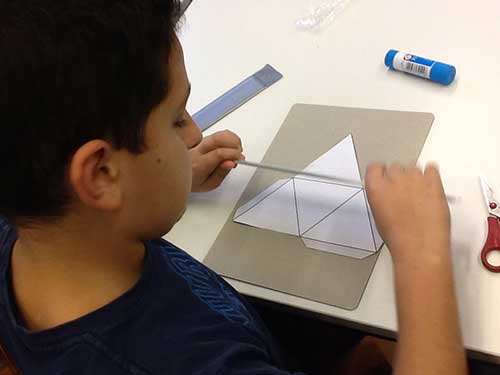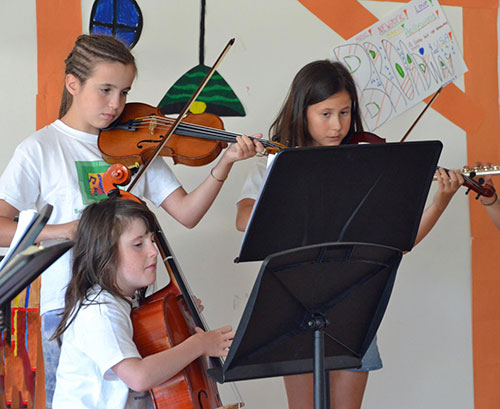Below you will find a selection of the most recent entries from bloggers in our Education section.
To view the entries from individual bloggers, click on the links below:
- Local Teacher Bloggers
Instead of asking teachers or staff from one particular school in the area, we've decided to host all of them under one heading. We expect great things to happen on this page, so make sure to check often to read their stories, insights, explanations, and thoughts on education for children, adults, special needs, or extra-curricular.
- Philippa Dobree-Carey is an adept project manager for an international organization in Geneva. Author of the award-winning student guide "From High School to Uni", Philippa successfully steers students step-by-step through the process of packing, preparing for and thriving in the university environment. This firsthand perspective has driven her to create a library of well-defined, pragmatic resources aimed at facilitating the transition to university life. Discover a treasure trove of invaluable resources by visiting her website www.fromhighschooltouni.com.
- Sabine Hutcheson
Sabine Hutcheson is an education professional with over twenty-five years’ experience in teaching and leadership in schools in Switzerland, the UK and neighbouring France. Sabine has worked as a Teacher, Education Consultant, University and Careers Advisor and, in the past eight years, has held senior leadership positions in schools in Geneva. She is currently the Head of Secondary Admissions at Geneva English School.
- Trudi Hayes
She is the Director of Swiss Language Group in Geneva, which comprises of three schools. Wall Street English, Swiss French School and Ecole Suisse d’Allemand. Trudi has a background in client relationship and service management and is a qualified English teacher. She and her team of language consultants help students find the best language courses for them, according to their individual objectives and requirements.
- Sandra Steiger
TutorsPlus Academic support manager, Sandra and has over 10 years’ experience teaching English at various schools in Switzerland. During her 6 years at the International School of Geneva, she was also the Service Learning programme Coordinator, Homeroom Mentor and Head of Year 8. Now she helps parents and students get the academic support they need.
- Sarah Frei
Head of Marketing and Communication at Brillantmont International School, Sarah is excited by the opportunities created by technology not only to communicate with the multicultural, far-flung school community but also to share knowledge and experiences about educational practice.

By Sarah Frei, Brillantmont International School
It’s that time of year again when exams dominate the horizon of many young people. For them, the next few weeks are synonymous with stress and hard work. Keeping a cool head, sticking to a well-organised revision schedule and taking time out to relax are key to a balanced approach. Read our top tips for exam success here:
Start revision sooner rather than later.
Don’t put off exam preparation until you really feel the pressure or your teachers and parents start nagging. By planning ahead and reviewing the materials as you go along, the weeks leading up the exams will be a lot easier. Your confidence will be boosted and you’ll be starting from a good place.
Develop study groups.
Your teachers may offer after school study groups covering particular topics or you may choose to set up such a group with your peers. Working together with friends, in person or via What’s App, can be a useful way to revise and test each other, as long as you clearly define boundaries (so you don’t end up simply chatting!).
Constantly review.
This learning strategy applies to the whole school year and not just to examination time. Whenever you learn something new, go over it at home in the following days to ensure that you have fully understood it. If not, ask you teacher for clarification. If you do this on a regular basis, you won’t come across huge chunks of material which you feel unsure about.
Take notes.
The act of writing notes helps us retain information. Notes are essential to revision. Make them as visual as you need, using spider diagrams, mind-maps and workflows in different colours. Whether you use glorious technicolour or simply black and white, clear, condensed notes should provide effective knowledge triggers in all subject areas.

By Sarah Frei, Brillantmont International School
Hard as it is to think about school when the sun burns bright above, it is nevertheless that time of year again when children are sharpening their pencils, packing their bags and worrying about what to wear on the first day back. Indeed, some may already be back in the classroom.
I'm lucky: my own two children love school and even during the first week of July were talking about the next school year, when frankly I was fed up with hearing the « s » word. However, for many children, returning to school can be a huge source of anguish, giving them a twisted knot in the pit of their stomachs. The root cause may have nothing at all to do with the learning: rather, the fears that torment them are about fitting in, popularity, being one of the crowd.
Middle School students are at a particularly vulnerable age. Look around any Middle School classroom and you'll see what I mean. The flat chested thirteen year old sits next to the eleven year old who still likes to play with Barbies but who struggles to accept that she already has the fully developed body of a grown woman. As for the boys, the one hunched up in the corner, attempting to hide the glaring pimples barely concealed in the dark stubble covered behind his hand, clearly eats industrial strength fertiliser every morning since he grows at least 5cm every night. His neighbour, meanwhile, would be blown over by a sudden gust of wind.

By Julie Tompkins-Wagner, www.Julie-music.com
As a performing arts educator, I am often putting my students on stage in all kinds of settings. I believe that this is a crucial part of their overall education and preparation for life. From the earliest years, encouraging your child to step up, prepare and deliver a performance is something that cannot be learned in any other way than by doing. As soon as children are old enough to speak clearly, sing a little song or move to some music, having them perform in front of an audience of any kind, be it large or small, family and friends, at school in a group or on stage in a recital, on their own or with a group, at school or summer camp, teaches your child how to face an audience and present themselves.
Just think about how many times in life those skills come in to play. Whether presenting a project at school, interviewing for university entrance, an internship or a job, or on the job—presenting your product, your marketing or organizational plan, or an idea of any sort, the presentation skills are all a part of life.

by Sara Dubler, www.haut-lac.ch
There are many ways to give your children and grandchildren a head start in life - from applying to the best nursery schools to helping them with their International Baccalaureate preparation. But for many parents and grandparents, the best thing they can do is provide a bilingual education for the young people in the family.
We live in a multilingual world, and that is likely to be true for decades to come. If your children are not equipped with the language skills they need, they will be limited in terms of educational opportunities, career options and even personal relationships. Giving your children the bilingual education they need will help them enormously - not only now but for the rest of their lives.
Bilingual education has a number of important benefits for people of all ages, but learning a new language is especially valuable for young children. While men and women certainly can learn a new language no matter what age they are, the growing brains of young children are better able to absorb those new words, sounds and grammar rules. Study after study has shown that young children learn new languages more readily and retain the information far better than adults.

Over the years, international schools have come under harsh criticism as not providing the best learning experience. These schools have been seen as a place where students who struggle with education are sent, or as isolated bubbles outside the community where non-native families become an insular micro-community. However, a new kind of international school is changing that view by taking a new approach to teaching. From community engagement to non-standardised teaching, at Lake Leman International School (LLIS) our students get the opportunity to develop their individual skills and create a personal leaning experience for themselves.





